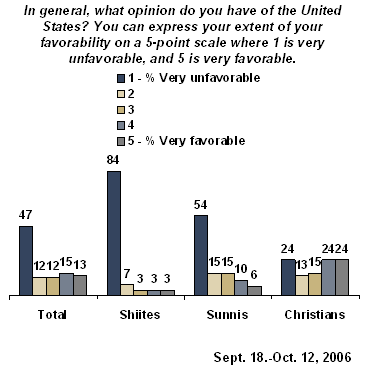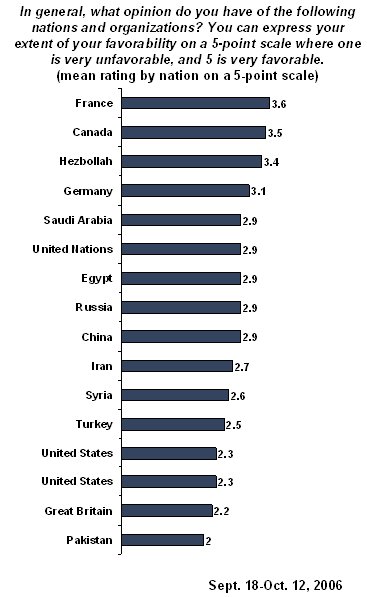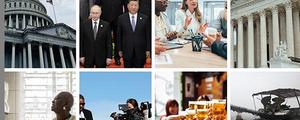GALLUP NEWS SERVICE
PRINCETON, NJ -- Lebanese attitudes toward the United States have dramatically worsened in recent months. Just one year ago, Gallup's polling in Lebanon revealed that the proportions who viewed the United States favorably (40%) and unfavorably (41%) were nearly even. Gallup's most recent survey, conducted in September and October after the 34-day conflict between Israel and Hezbollah, found that Lebanese are now twice as likely to express an overall negative opinion of the United States (59%) as a positive one (28%). Nearly half of Lebanese (47%) go so far as to say they have a "very unfavorable" view of the United States.

The recent conflict has played a major role in this deterioration of opinion. Respondents were asked, "Can you please tell me whether you personally have a much worse, somewhat worse, somewhat better, or much better opinion of the United States than you did before the recent 34-day conflict?" Nearly two-thirds (64%) of all Lebanese say they now hold a worse opinion of the United States than they did immediately prior to the conflict -- including 48% who describe their new appraisal as "much worse." Just 11% of Lebanese say their view of the United States is now more positive than it was prior to the 34-day conflict. Even Christian Lebanese -- historically the most supportive of the United States -- are considerably more likely to say their appraisal worsened (44%) than to say it improved (18%) over this relatively short period. More than one-fourth of Christian Lebanese (27%) say their view of the United States is "much worse" than it was prior to the conflict.
The net effect on Lebanon of U.S. diplomacy is also viewed harshly. Lebanese were shown a list of 14 European, North American, Asian, and predominantly Muslim countries* and asked which of them, if any, could be accurately described by the phrase, "on the whole, its policies harm Lebanon more than they help Lebanon." The country most widely associated with this characteristic was the United States (69%), which significantly outdistanced Syria (42%), Iran (31%), and Great Britain (31%). Almost all Shiite respondents (95%) said the United States is a country whose policies, on balance, harm Lebanon -- but so did roughly three-quarters (74%) of all Sunnis, and roughly half (51%) of all Christians.
Similarly, 61% of all Lebanese respondents most often identified the United States as a country to which the term "hypocritical" may be appropriately applied -- with Syria (32%), Great Britain (26%), and Iran (16%) as distant runners-up.
Other Evaluations
If views of the United States have deteriorated sharply among Lebanese, which foreign nations are admired? On a five-point scale ranging from 1 = "very unfavorable" to 5 = "very favorable," France receives the highest average rating among the 13 nations tested** (3.6), followed closely by Canada (3.5). Other countries with positive ratings among the Lebanese are Germany (3.1), Saudi Arabia, Egypt, Russia, and China (all 2.9), Iran (2.7), and Syria (2.6). Turkey receives the mid-point rating of 2.5. Great Britain (2.2) and Pakistan (2.0) are the only countries other than the United States (2.3) to receive unfavorable ratings on balance.

As with ratings of the United States, the average ratings for all of these countries conceal dramatic differences between religious sects. Not surprisingly, a far higher proportion of Lebanon's Sunnis give positive ratings to Saudi Arabia than is the case among Shiites or Christians. Conversely, Shiites are far more likely to view Iran and Syria favorably than are Sunnis or Christians. Pakistan draws much of its low net evaluation from Lebanon's Christians, fully 70% of whom rate it negatively.
Interestingly, Canada is the only tested country that draws net positive appraisals from all three major religious groups (Christians: 77% positive, 9% negative; Sunnis: 49% positive, 23% negative; and Shiites: 40% positive, 36% negative). Canada's very high approval ratings challenge the hypothesis that Lebanese disapproval of the United States is fundamentally driven by a "clash of civilizations." Canada's high ratings suggest it has more to do with policies specific to the United States.
The United Nations also receives a positive average rating (2.9), though this is largely due to favorable evaluations by Lebanese Christians (57% positive, 24% negative). Lebanon's Sunnis (33% positive, 44% negative) and Shiites (12% positive, 70% negative) are far less likely to hold favorable views of the U.N.
* For this question, the countries listed were the United States, Great Britain, France, Japan, the United Arab Emirates, China, Saudi Arabia, Russia, Lebanon, Germany, Syria, Egypt, Canada, and Iran
** On this measure, the countries tested were France, the United States, Great Britain, China, Russia, Germany, Turkey, Saudi Arabia, Pakistan, Egypt, Canada, Iran, and Syria. The United Nations and Hezbollah were also rated.
Survey Methods
Results are based on face-to-face interviews conducted between Sep. 18-Oct. 12, 2006, with a randomly selected national sample of 1,000 Lebanese adults, aged 18 and older. For results based on these samples, one can say with 95% confidence that the maximum error attributable to sampling and other random effects is ±3 percentage points. In addition to sampling error, question wording and practical difficulties in conducting surveys can introduce error or bias into the findings of public opinion polls.
